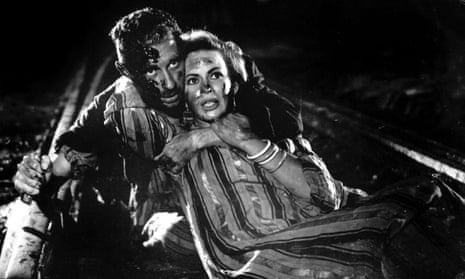For anyone seeking a primer on classic cinema in the digital media era, the so-called “big three” of streaming - Netflix, Amazon and Hulu - might not be the ideal place to start. Take Netflix as an example: of the roughly 6,000 titles currently available on the platform, fewer than 20 are feature films that were released before 1970. Netflix’s interest in auteurs, meanwhile, has so far largely been confined to contemporary Hollywood (think David Fincher, Noah Baumbach, heck even Adam Sandler if you’re generous). As streaming services go, it’s the equivalent of a library with nothing but murder mystery novels – some good, some bad, but whodunnits all the same – and one dusty shelf at the back for everything else.
It was almost shocking, then, when Netflix recently added to its platform a catalogue of classic Middle Eastern films, including a dozen from a giant of Arabic cinema whose work has before now received scant exposure in the west. Netflix’s Youssef Chahine collection isn’t just a random dump of the late Egyptian film-maker’s movies, either: it’s a well-curated panorama of an eclectic, often challenging, 57-year career. There are Kazan-esque social melodramas (two of which, The Blazing Sun and Dark Waters, star a pre-Hollywood Omar Sharif); there’s a Crusades epic, Saladin, that was essentially big budget propaganda for then president of Egypt Gamal Abdel Nasser’s pan-Arab state project; postmodern musical The Return of the Prodigal Son, a bitter allegory about the failure of said project; and a trilogy of queer autobiographical films. Best of all, there is Cairo Station.
An accessible entry point into a kaleidoscopic filmography that frequently mixes genres in surprising ways, 1958’s Cairo Station has the feel of an Italian neorealist drama morphing into a Hitchcockian proto-slasher. It begins somewhat deceptively as a diorama of the titular rail hub, where disgruntled porters, including would-be union organiser Abu Serih (Farid Shawqi), and unlicensed soda sellers led by Hanuma (Hind Rostom), Serih’s bride-to-be, slog away while dreaming of better lives. But lusting dangerously after Hanuma from the margins is Kenawi, a physically disabled newspaper hawker – played by Chahine himself - whose bashfulness and “lame” leg lead the other station workers to mock, pity and ultimately underestimate the man.
Though set in a single location and running only 73 minutes, a welcome kind of economy in this age of supersized cinema, Cairo Station finds time to examine the wider society of its day and place. Chahine’s film offers a look a world that’s foreign not just to western eyes today: this is a newly postcolonial Cairo on the edge of modernity, where the sands of one of the oldest civilisations still swirl in the streets, and where sharp-suited business types rub shoulders with newspaper boys wearing little more than rags.
The film itself is located somewhere between a forward-looking present and a more conservative past. Violence is scarce though surprisingly bloody when it comes, but it’s the film’s eroticism that’s most remarkable given its age. Chahine, who spent his career finding creative workarounds to defy Egyptian censors, at one point in Cairo Station gives us a sex scene where the lovers remain entirely off-screen. As Abu Serih and Hanuma disappear into a quiet warehouse together, a heated argument turning to flirtatious giggling turning to charged silence, a lurking Kenawi watches a heaving train pass outside, the tracks bending and straining, mimicking their sex – and hinting at the violence slowly building in him.
Though its neorealist bent places the film stylistically in the 1950s, as a portrait of troubled male psychology, Cairo Station feels almost modern. Chahine, who originally trained as an actor before pivoting to directing, took the film’s lead role himself allegedly because no other actor would dare. As a disturbed, sexually repressed loner whom the audience is challenged to sympathise with despite loathsome intentions, Kenawi anticipates the likes of Norman Bates and Peeping Tom’s Mark Lewis (and, later, Travis Bickle; naturally, Martin Scorsese is a Chahine fan).
A proud Egyptian – or, at the least, a fiercely patriotic man who took pride in the possibility of what Egypt could be – Chahine nevertheless always interrogated his country’s politics and culture in his work; here in his depiction of both the disaffected Kenawi and the film’s other male characters, many of whom think themselves entitled to women while simultaneously assuming it’s women who are always to blame for any unwanted male attention, Chahine also anticipated conversations around toxic masculinity and incel culture by some six decades. Cairo Station is a lesson in the value of classic cinema: along with Youssef Chahine’s wider filmography, much of which deals in queer subtext, it teaches that films don’t necessarily have to be new to be contemporary.
Cairo Station is available on Netflix in the US and UK

Comments (…)
Sign in or create your Guardian account to join the discussion